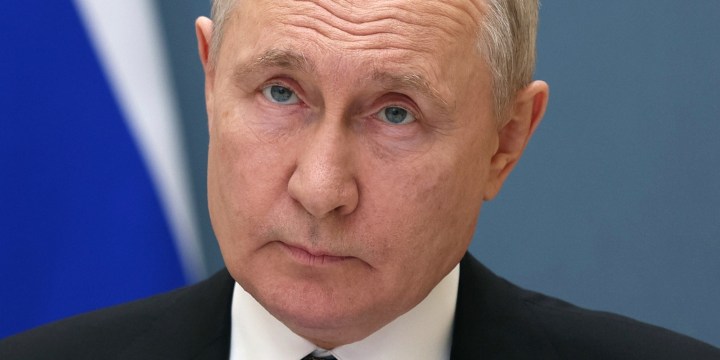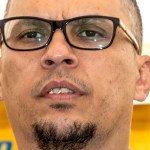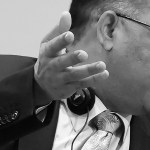UKRAINE UPDATE: 3 NOVEMBER 2023
Putin revokes Russia’s ratification of nuclear test ban treaty; Germany provides Kyiv with more military aid

President Vladimir Putin withdrew Russia’s ratification of a ban on nuclear weapons tests after complaining last month that the US had failed to finalise the treaty outlawing them. Russia was among 178 countries that had ratified the 1996 Comprehensive Nuclear Test Ban Treaty, though it hasn’t entered into force globally.
Germany provided Ukraine with a further military aid package, including armoured personnel carriers, air surveillance radar systems and reconnaissance drones, Kyiv’s defence ministry said in a post on X.
Earlier, the Ukrainian army’s commander-in-chief, Valeriy Zaluzhnyi, said Russia’s invasion was now in a new phase of “positional” warfare of static and attritional fighting, as in World War 1. Zaluzhnyi, writing in The Economist, said this would benefit Russia, allowing it to rebuild its military power.
Latest developments
- Putin signs law revoking nuclear test ban treaty ratification
- Speaker Johnson wants to pair Ukraine aid with border security
- Ukraine labels Nestlé ‘sponsor of the war’ for staying in Russia
- US sanctions Russia’s Sistema and dual-use network
- Biden doctrine: Show strength, whisper restraint: Andreas Kluth
US sanctions UAE firms in push to curb Gulf state’s Russian ties
The US targeted several companies based in the United Arab Emirates in the latest round of Russia-related sanctions as it seeks to up the pressure on the Gulf country to curb ties with Moscow.
The US Treasury Department blacklisted 130 individuals and companies in an effort to clamp down on Russia’s defence and technology sectors, as well as companies and people in third countries that help move goods into Russia. Several companies based in the UAE and Turkey were on the list, including logistics and at least one financial services firm.
Western officials have pressed for the oil-rich UAE to stop acting as a gateway for Russia to get around sanctions.
Russia has so far been able to get around some of the trade restrictions imposed on it by the US, UK and Europe by routing banned goods via third countries such as the Gulf country, as well as Turkey and some Central Asian nations that have not introduced sanctions themselves. Dubai, the UAE’s commercial hub, also has seen an influx of Russians and their capital since the February 2022 invasion of Ukraine.
The US said the sanctions were aimed at entities which trade goods that can be used as dual-use items for President Vladimir Putin’s war in Ukraine and financial services firms.
US sanctions Russia’s Sistema and dual-use network
The US imposed sanctions on Thursday on one of Russia’s largest publicly traded holding companies, Sistema, in a new package of restrictions also targeting firms in China, Turkey and the United Arab Emirates that are said to provide dual-use items for President Vladimir Putin’s war in Ukraine.
In addition, the Treasury Department sanctioned Sistema subsidiaries in Luxembourg, Russia and Singapore and said any entity in which Sistema has an ownership stake of 50% or more would be subject to blocking sanctions. Sistema was already sanctioned by the UK soon after Russia invaded Ukraine.
The sanctions were part of a broader package targeting 130 individuals and entities aimed at clamping down on Russia’s defence and technology sectors, as well as companies and people that help move goods through third countries and into Russia.
Kim Jong-un sees bigger cash cow in Russia arms than embassies
Leader Kim Jong-un is launching his biggest scaling back of North Korea’s embassies, likely betting he can earn a larger payout in arms deals with the Kremlin than through missions suspected of sending him a cut of the proceeds of their alleged crimes.
While Kim’s isolated regime has ramped up its diplomatic activity with Russia, official media reports said it shuttered its embassies in Uganda and Angola in October.
Pyongyang plans to shut its consulate in Hong Kong and more than a dozen diplomatic establishments in Africa and elsewhere, according to Japan’s Yomiuri newspaper, citing a source familiar with North Korea’s internal affairs that it did not name. Its embassy in Spain is among the targeted closures, Yonhap News Agency of South Korea reported.
South Korea’s Unification Ministry believes Kim is running out of money to keep all its diplomatic facilities operating due to global sanctions draining his coffers of cash, Yonhap reported. Pyongyang currently has 47 embassies, three consulates, and three representative offices, according to the ministry.
North Korea’s embassies have occupied an unusual place in the diplomatic world with the US, UK and others accusing many of them of hatching illegal financial schemes to fund their operations, procure luxury goods for the leaders in Pyongyang and send back cash generated through nefarious means.
North Korea regularly denies any accusations made by the US and its partners of wrongdoing.
The closures come as North Korea appears to have stepped up a lucrative business in sending munitions to Russia to help in its assault on Ukraine.
Since August, North Korea has sent more than one million artillery shells for Putin’s war machine, South Korean lawmaker Yoo Sang-bum said Wednesday after attending a briefing by the country’s spy agency.
High demand from Russia’s war on Ukraine has driven up global artillery prices, with the 155mm shells used by Nato forces priced at about $3,000 each. If North Korea sold shells at similar prices, the value of its shipments to Russia would exceed $3-billion, more than 10% of North Korea’s economy, based on an estimate of its annual output by South Korea’s central bank.
Russia is probably offering Kim a package of assistance that may include cash, access to its banking systems, technology transfers and help in procuring components overseas that could be used to build weapons, he said.
This is probably a far better deal than he gets from embassies.
The world first got a glimpse of some of the activities in 1976 when Denmark, Norway, Sweden and Finland accused a ring of North Korean diplomats of illegally smuggling duty-free cigarettes and liquor for sale on the retail market, as well as trying to traffic hashish.
In places such as Zimbabwe, Zambia and Angola, North Korean officials were suspected of using their diplomatic pouches and other means to traffic items such as rhino horn and elephant tusks, according to a report by UK think tank the Royal United Services Institute for Defence and Security Studies.
Ukraine labels Nestlé ‘sponsor of the war’ for staying in Russia
Ukraine’s anti-corruption agency has accused Nestlé of being an “international sponsor of war” for continuing to sell goods and pay taxes in Russia.
The world’s biggest food maker has been added to a list that includes rival consumer companies Mondelez International, PepsiCo and Unilever, the National Agency on Corruption Prevention told Bloomberg.
“Despite the ongoing Russian aggression against Ukraine, Nestlé continues to operate in the aggressor state,” the agency said. The designation is designed to cause reputational harm to businesses, but carries no legal consequences.
Nestlé has said it stands with Ukraine and its 5,500 staff there. The maker of Maggi stock cubes has stopped advertising and investing capital in Russia and has ceased selling the vast majority of its products, such as KitKats, in the country. Nestlé isn’t contravening any sanctions by staying in Russia. The company didn’t comment on the agency’s decision.
The Swiss company and Unilever have pledged support for Ukraine, but continue to sell products like ice cream and stock cubes in Russia.
Nestlé has six factories in Russia, according to its last annual report, including a confectionery site. Russia generated around 2% of its sales in 2021. No 2022 accounts were available on the Russian tax service website, but consumer goods peers like PepsiCo saw their businesses there boom in 2022.
Putin signs law revoking nuclear test ban treaty ratification
Putin withdrew Russia’s ratification of a ban on nuclear weapons tests after complaining last month that the US had failed to finalise the treaty outlawing them.
Russia was among 178 countries that had ratified the 1996 Comprehensive Nuclear Test Ban Treaty, though it hasn’t entered into force globally because it must be signed and confirmed by 44 named states that either have nuclear weapons or possess atomic reactors. While the US is one of the 187 nations that signed the agreement, it hasn’t ratified the treaty through a vote in the Senate.
The US hasn’t carried out such nuclear tests since signing the pact. Putin has previously said that Russia wouldn’t resume tests unless the US does.
Russia’s State Duma unanimously passed the Bill last month to undo the treaty’s ratification. DM


















 Become an Insider
Become an Insider
Comments - Please login in order to comment.